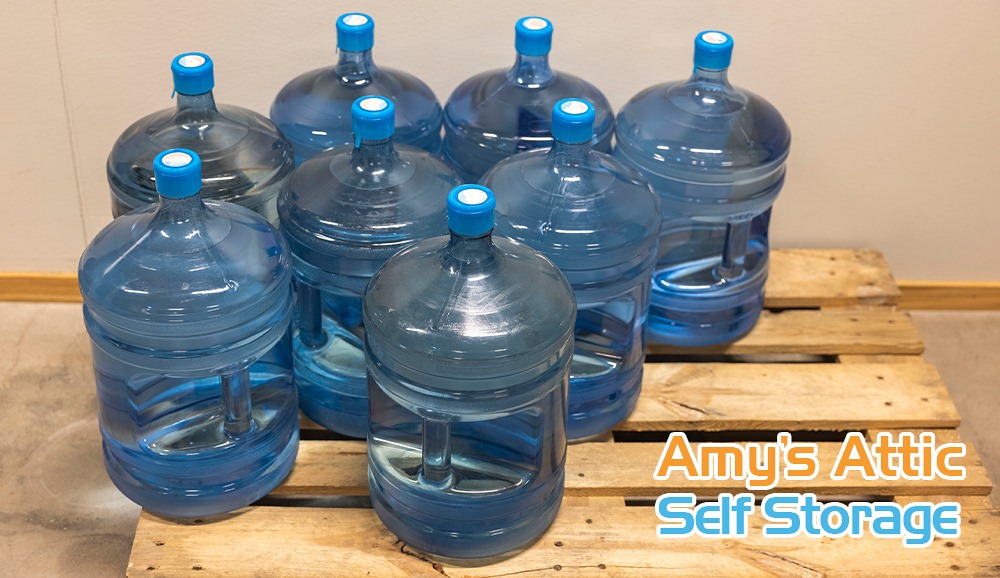As a resident of Texas, preparing for any type of emergency is something you should consider doing. One of the most important supplies we need to live and survive is water, which is why many homeowners consider storing water in a storage unit. Today, we’re going to share our complete guide on how to properly store water in a storage unit, as well as answer some frequently asked questions about water storage.
Why Should You Consider Storing Water In Your Texas Storage Unit?
Whether you’ve lived in Texas your whole life, or have recently moved here, you no doubt know the state experiences a variety of weather issues each and every year. In order to prepare for any type of emergency, it’s well worth putting various supplies in a Texas storage unit that’s separate from your home. While you should also keep water on hand in your garage or home, having some stored separately will help you to better prepare for every natural disaster and scenario. . Just a small amount of water could make a huge difference during a major emergency, and give you an extra level of protection and comfort.
How To Store Water For Long Term Storage
When storing water for a long period of time, there are certain things to think about ahead of moving the water into a storage unit.
- Ensure you are choosing high-quality water that is placed in a secure container so there’s no risk of leakage during the storage time.
- Label your container as drinking water, and then add the date that you are putting it into storage on the bottle. We recommend placing water in a storage unit that is a cool temperature, with the best range being between 50°F – 70°F.
- Keep your water containers away from direct sunlight in order to avoid evaporation and condensation.
- Make sure you also check with your storage unit that liquids are allowed, as there are some locations which don’t allow you to store liquids of any type.
What Type of Material / Container Is Best For Storing Water?
The best option for storing water is to use a food-grade plastic bottle. Plastic bottles should always be BPA free in order to keep the water safe for human consumption. These containers are the bottles that you’ll typically find water sold in when you purchase it from your local Texas grocery store or a reputable water company. The other option is to use glass bottles, but make sure these bottles haven’t stored non-food items before or anything that may infiltrate your water. Your best course of action is to use brand new containers for storage, to avoid any type of cross contamination of your water when it will be stored for multiple months at a time. When you place your bottles into storage, you are best off raising the water off of the ground using wooden planks or sturdy pallets.
Does Water Need To Be Stored In A Climate-Controlled Storage Unit?
To keep your water in the best condition possible, we recommend using a climate-controlled storage unit. The main thing you need to avoid is a storage unit that’s either too hot or cold, in order to avoid frozen or evaporated water.. A climate-controlled storage unit will allow you to choose the perfect temperature for your water, which should be between 50°F – 70°F. Talk to any storage facility before booking your unit to ensure that they have this option available to you, and that your unit will remain at your desired temperature during the time the water will be in storage.
How Long Can Water Be Stored Before It Goes Bad?
It’s typically recommended to store water for only about six months at a time. After this time, you’ll need to check the quality of the water and containers and possibly replace them. If you follow the tips we’ve shared above, then your water should remain in drinking condition for half a year at a time. Make sure you keep it away from direct sunlight and in a storage unit that’s climate controlled to avoid evaporation or issues with your containers. To help remember when to replace your water, make sure you mark your water containers so you know when they were first placed inside the storage unit.
As far as the quantity of water that you should store, it’s recommended that you store enough water to offer everyone one gallon of water a day for up to three days for both drinking and washing. A two-week supply would be ideal, but obviously this option requires a lot more storage space. Make sure you also think about pets and anyone in your family who may require more water for medical reasons. In Texas, the hotter summer temperatures may make you want more water, so keep the time of year / weather in mind as well.
Local Water Provider Spotlight: Hill Country Springs
Are you looking for a reliable water provider in Texas? If so, we recommend checking out Hill Country Springs. The company is Central Texas’ largest independent water company and offers bottled water services as well as commercial water filtration systems. They offer the highest quality of water to the local community and they work hard to support the local community and other companies during times of need. Finding a reliable source of water to put into your storage unit will ensure that you have good-quality water should you need to use it in an emergency.
Preparing for emergencies is something we should all be doing in order to protect our loved ones. Now that you know why and how to store water in a storage unit, we recommend that you consider doing this preparation to avoid issues in the future. If you are looking for a storage unit in the Texas area, then don’t hesitate to reach out to our team. We offer a variety of storage solutions for individuals and business owners and will be here to support you with your storage needs this year.
About Amy’s Attic Self Storage
Amy’s Attic Self Storage proudly serves Central Texas with innovative storage units and storage services. With five locations across Central Texas, our facilities offer an accessible, secure, and clean storage environment for your needs. If you have any self-storage questions, then please visit our website at https://www.amysatticss.com or visit a Texas location near you.






